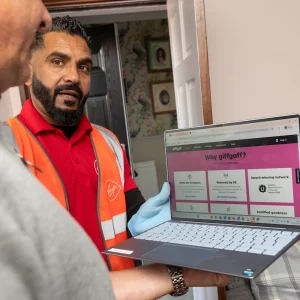Sponsored Links
Lang On ISP Market Consolidation
Posted: 11th Nov, 2004 By: MarkJ
Mark Lang, founder of ISP Eclipse Internet and now Director of Broadband and ISP Development for the Kingston Group, has issued an interview in which he offers up his own perspective on the current wave of consolidation:
Q: Is the UK's ISP sector going through a period of consolidation? If so, why?
A: The broadband market is currently in a chaotic, transitional phase as it moves towards mass market appeal. To drive this mass market penetration, prices were inevitably forced down throughout 2004 as ISPs invested heavily to gain market share.
The critical challenge for ISPs is that broadband inspires little emotional attachment or enthusiasm (except from the evangelical innovators) - it is an enabling technology, with comparisons often made with commodity industries such as electricity and water supply. Ultimately the customer is a co-producer of the service with the benefits gained being dependent on the way in which the technology is used.
Strategies in these markets tend to exploit economies of scale, which ultimately leads to consolidation of proliferated markets. There are also a lot of new entrants to the market, such as Wanadoo and AOL, that have amplified market forces and driven broadband into the mass market. All that said, I am sure that there will always be opportunities to exploit through innovative positioning, shrewd targeting and niche marketing for smaller providers.
Q: Is this period of consolidation any different to any others we have experienced?
A: The consolidation of the broadband market throughout 2004 has been far more aggressive than any previous periods. Middle-tier ISPs are consolidating to increase economies of scale in order to defend and grow their positions in the face of extremely powerful marketing machines. There have been considerable strategic 'land grab' tactics over the past twelve months as larger ISPs look to capitalise on the broadband market through increased marketing activity and churning existing dial-up customer bases. The competitive nature of the broadband market has generated a plethora of diverse offerings meaning that the power is shifting away from the ISP towards the customer. In the future ISPs will need to be either very dynamic or rely on a powerful brand name.
This shift in power has borne many strategic buyouts involving complementary organisations such as Eclipse and Kingston Communications. Such buyouts allow core competencies to be leveraged effectively. A Telco acquisition of an ISP is a perfect example, and clearly demonstrates a future trend in the market and the need for convergence of expertise.
Many current ISPs are too big to be small and too small to be big - lacking the resources to be able to fully exploit market opportunities. There is a strong threat that they become 'stuck in the middle', unable to compete with the powerful brands but also lacking key differentiators that can help maintain their niche position.
Q: Are the issues driving consumer ISP consolidation the same as those behind the business ISPs?
A: The same market forces apply to both the consumer and business markets. I would expect both markets to follow a similar path of consolidation. The trends that we are seeing today have primarily been driven by the mass market appeal and economies of scale that can be gained from the consumer market as this is by far the biggest market with greater economies to exploit.
Q: Is the UK's ISP sector going through a period of consolidation? If so, why?
A: The broadband market is currently in a chaotic, transitional phase as it moves towards mass market appeal. To drive this mass market penetration, prices were inevitably forced down throughout 2004 as ISPs invested heavily to gain market share.
The critical challenge for ISPs is that broadband inspires little emotional attachment or enthusiasm (except from the evangelical innovators) - it is an enabling technology, with comparisons often made with commodity industries such as electricity and water supply. Ultimately the customer is a co-producer of the service with the benefits gained being dependent on the way in which the technology is used.
Strategies in these markets tend to exploit economies of scale, which ultimately leads to consolidation of proliferated markets. There are also a lot of new entrants to the market, such as Wanadoo and AOL, that have amplified market forces and driven broadband into the mass market. All that said, I am sure that there will always be opportunities to exploit through innovative positioning, shrewd targeting and niche marketing for smaller providers.
Q: Is this period of consolidation any different to any others we have experienced?
A: The consolidation of the broadband market throughout 2004 has been far more aggressive than any previous periods. Middle-tier ISPs are consolidating to increase economies of scale in order to defend and grow their positions in the face of extremely powerful marketing machines. There have been considerable strategic 'land grab' tactics over the past twelve months as larger ISPs look to capitalise on the broadband market through increased marketing activity and churning existing dial-up customer bases. The competitive nature of the broadband market has generated a plethora of diverse offerings meaning that the power is shifting away from the ISP towards the customer. In the future ISPs will need to be either very dynamic or rely on a powerful brand name.
This shift in power has borne many strategic buyouts involving complementary organisations such as Eclipse and Kingston Communications. Such buyouts allow core competencies to be leveraged effectively. A Telco acquisition of an ISP is a perfect example, and clearly demonstrates a future trend in the market and the need for convergence of expertise.
Many current ISPs are too big to be small and too small to be big - lacking the resources to be able to fully exploit market opportunities. There is a strong threat that they become 'stuck in the middle', unable to compete with the powerful brands but also lacking key differentiators that can help maintain their niche position.
Q: Are the issues driving consumer ISP consolidation the same as those behind the business ISPs?
A: The same market forces apply to both the consumer and business markets. I would expect both markets to follow a similar path of consolidation. The trends that we are seeing today have primarily been driven by the mass market appeal and economies of scale that can be gained from the consumer market as this is by far the biggest market with greater economies to exploit.
Search ISP News
Search ISP Listings
Search ISP Reviews
Latest UK ISP News







Cheap BIG ISPs for 100Mbps+
150,000+ Customers | View More ISPs
Cheapest ISPs for 100Mbps+
Modest Availability | View More ISPs
Latest UK ISP News
Helpful ISP Guides and Tips
Sponsored Links
The Top 15 Category Tags
- FTTP (6916)
- BT (3917)
- Politics (3119)
- Business (2821)
- Openreach (2703)
- Building Digital UK (2537)
- Mobile Broadband (2526)
- Statistics (2161)
- FTTC (2153)
- 4G (2131)
- Virgin Media (2065)
- Ofcom Regulation (1801)
- 5G (1781)
- Fibre Optic (1616)
- Wireless Internet (1615)
Sponsored
Copyright © 1999 to Present - ISPreview.co.uk - All Rights Reserved - Terms , Privacy and Cookie Policy , Links , Website Rules





























